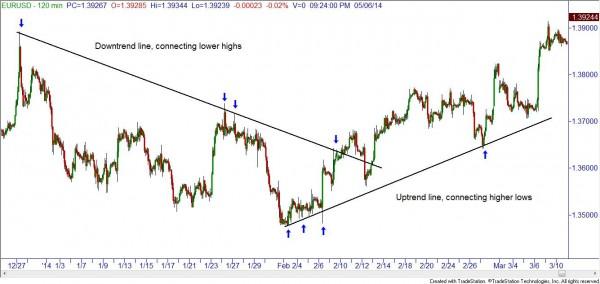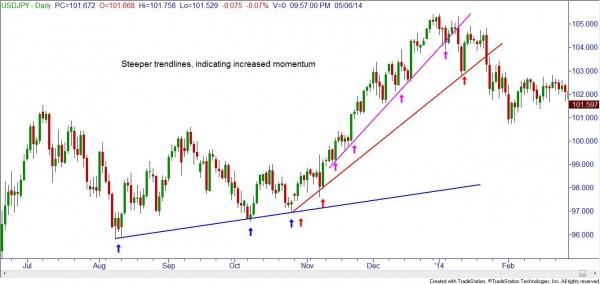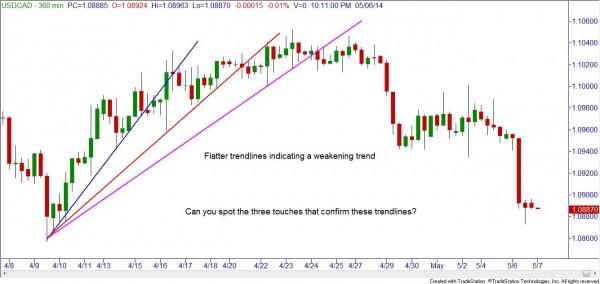![]()
Hello traders! In this week’s newsletter, I’d like to show you a couple of techniques to use trend lines to help you determine the strength or weakness of a trend.
As you have probably noticed from reading our weekly Lessons from the Pros newsletters, our core strategy includes going long in up trends at high quality demand zones, and going short in downtrends in high quality supply zones. A few significant stumbling blocks that new traders encounter is defining the trend that they are in, if that trend still has room to run, or if the trend is getting ready to end. While no trend definition technique is truly infallible, proper use of trend lines can help keep you on the right side of the charts.
So let’s define our trends first. An uptrend is a series of higher lows and higher highs-a trend line is most commonly drawn connecting the higher lows. As we learned in grade school, it takes two points to draw a line, but in a trading, that isn’t enough. We like to have at least three touches of the trend line to confirm that the line is valid. As far as I am concerned, the more touches of that trend line the better! A downtrend is defined as a series of lower highs and lower lows, with the trend line drawn connecting the lower highs.
One thing to note about the technique illustrated above: I drew my trend lines through a few candle wicks and tails, but not through any candlestick BODIES. Because the spot forex market is a decentralized marketplace, and not every brokerage firm displays the exact same prices especially at volatile turning points in the market, my plan allows me to draw in this fashion. Some traders will insist that you may never draw through any part of a candlestick. My rule works for me, so I will continue to use it!
In any particular move in the market, there are two opposing forces at work – buyers and sellers, demand and supply. This should be a bit obvious to any reader of our newsletters! But there is also a competition between different groups of buyers, and different groups of sellers. Some are more aggressive than others, some even bordering on the foolishly aggressive. To illustrate this point, we will look at trend lines now representing different parts of an uptrend.
In the following chart, I’ve drawn in three trend lines, first the blue, then red, then pink. Each line is getting progressively steeper indicating increasing momentum in this trend.
One very important point about these steeper trend lines is the faster a pair goes one direction, once the trend reverses the move is usually very fast as well! Who do you think is still buying this currency pair at the fourth or fifth touch of that trend line? Whoever they are, they have been chasing a trend and missed the good entry many, many candles ago! The phrase “irrational exuberance” famously uttered by Alan Greenspan a few years back, could be used to describe the buyers high up on this steepest trend line. As the trend lines get steeper, these competing buyers are becoming more and more aggressive. I would prefer to find another pair to trade, than to buy high up on this curve. By the way, in the spot Forex market, this three trend line technique indicating a too-strong trend is also applicable to downtrends. For brevity’s sake, a chart was not included. One more hint about these three steeper trend lines: don’t try to be the hero who sells the very top of the market. If a very strong uptrend is still valid, I would prefer to wait for that steepest trend line to break before trying to short this pair. There is no Hall of Fame for shorting at the highest point, but there is a poor house for people who keep trying to pick the top! (Or buy the bottom, for that matter!)
So, if three trend lines can indicate a trend that is going one direction too fast, can they also indicate when a trend has sufficiently slowed to change my bias from long to short (or short to long)? Glad you asked, and the answer is yes. On the following chart I drew in three flatter trend lines, each having at least three touches making them valid lines. As they get flatter, that is indicating a weakening uptrend here.
When the third flatter trend line finally does break, I am no longer looking for long trades but focusing on shorting opportunities. As in the previous example, I’m not trying to be the first trader to be short here! When the first (blue) trend line breaks, that doesn’t necessarily mean we are in a downtrend, just that the uptrend is losing a bit of momentum.
If you choose to employ these trend line techniques to your trade plan, please make sure you are using them in conjunction with our core strategy of buying in demand and selling in supply. Keep your losses small and let your winners run!
This content is intended to provide educational information only. This information should not be construed as individual or customized legal, tax, financial or investment services. As each individual's situation is unique, a qualified professional should be consulted before making legal, tax, financial and investment decisions. The educational information provided in this article does not comprise any course or a part of any course that may be used as an educational credit for any certification purpose and will not prepare any User to be accredited for any licenses in any industry and will not prepare any User to get a job. Reproduced by permission from OTAcademy.com click here for Terms of Use: https://www.otacademy.com/about/terms
Editors’ Picks

EUR/USD challenges 1.1800, two-week lows
EUR/USD remains on the defensive, extending its leg lower to the vicinity of the 1.1800 region, or two-week lows, on Tuesday. The move lower comes as the US Dollar gathers further traction ahead of key US data releases, inclusing the FOMC Minutes, on Wednesday.

GBP/USD looks weaker near 1.3500
GBP/USD adds to Monday’s pessimism and puts the 1.3500 support to the test on Tuesday. Cable’s marked pullback comes in response to extra gains in the Greenback while disappointing UK jobs data also collaborate with the offered bias around the British Pound.

Gold loses further momentum, approaches $4,800
Gold recedes to fresh two-week troughs around the $4,800 region per troy ounce on Tuesday. The precious metal builds on Monday’s downtick following a marked rebound in the US Dollar and mixed US Treasury yields across the board.

Crypto Today: Bitcoin, Ethereum, XRP upside looks limited amid deteriorating retail demand
The cryptocurrency market extends weakness with major coins including Bitcoin (BTC), Ethereum (ETH) and Ripple (XRP) trading in sideways price action at the time of writing on Tuesday.

UK jobs market weakens, bolstering rate cut hopes
In the UK, the latest jobs report made for difficult reading. Nonetheless, this represents yet another reminder for the Bank of England that they need to act swiftly given the collapse in inflation expected over the coming months.
RECOMMENDED LESSONS
Making money in forex is easy if you know how the bankers trade!
I’m often mystified in my educational forex articles why so many traders struggle to make consistent money out of forex trading. The answer has more to do with what they don’t know than what they do know. After working in investment banks for 20 years many of which were as a Chief trader its second knowledge how to extract cash out of the market.
5 Forex News Events You Need To Know
In the fast moving world of currency markets where huge moves can seemingly come from nowhere, it is extremely important for new traders to learn about the various economic indicators and forex news events and releases that shape the markets. Indeed, quickly getting a handle on which data to look out for, what it means, and how to trade it can see new traders quickly become far more profitable and sets up the road to long term success.
Top 10 Chart Patterns Every Trader Should Know
Chart patterns are one of the most effective trading tools for a trader. They are pure price-action, and form on the basis of underlying buying and selling pressure. Chart patterns have a proven track-record, and traders use them to identify continuation or reversal signals, to open positions and identify price targets.
7 Ways to Avoid Forex Scams
The forex industry is recently seeing more and more scams. Here are 7 ways to avoid losing your money in such scams: Forex scams are becoming frequent. Michael Greenberg reports on luxurious expenses, including a submarine bought from the money taken from forex traders. Here’s another report of a forex fraud. So, how can we avoid falling in such forex scams?
What Are the 10 Fatal Mistakes Traders Make
Trading is exciting. Trading is hard. Trading is extremely hard. Some say that it takes more than 10,000 hours to master. Others believe that trading is the way to quick riches. They might be both wrong. What is important to know that no matter how experienced you are, mistakes will be part of the trading process.
The challenge: Timing the market and trader psychology
Successful trading often comes down to timing – entering and exiting trades at the right moments. Yet timing the market is notoriously difficult, largely because human psychology can derail even the best plans. Two powerful emotions in particular – fear and greed – tend to drive trading decisions off course.



